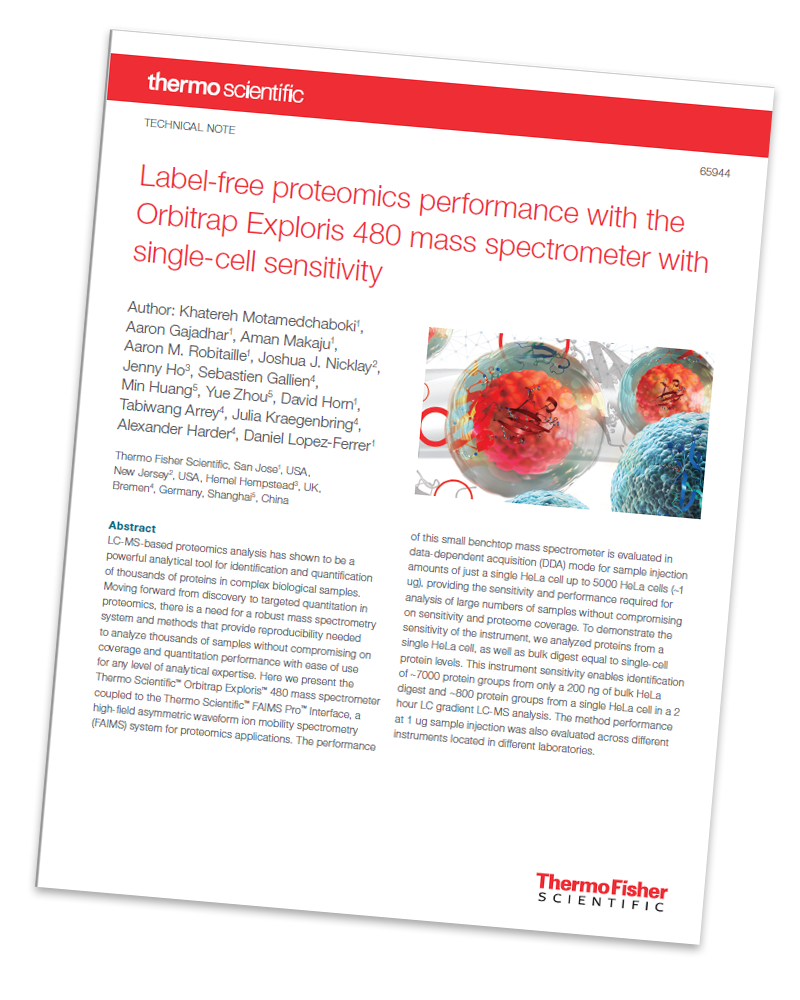This technical note introduces the The Thermo Scientific™ Orbitrap Exploris™ 480 MS for protein and peptide identifications offering high reliability across instruments and sites — an essential for large-scale studies.

 Abstract
Abstract
LC-MS-based proteomics analysis has shown to be a powerful analytical tool for identification and quantification of thousands of proteins in complex biological samples. Moving forward from discovery to targeted quantitation in proteomics, there is a need for a robust mass spectrometry system and methods that provide reproducibility needed to analyse thousands of samples without compromising on coverage and quantitation performance with ease of use for any level of analytical expertise. In this technical note the Thermo Scientific™ Orbitrap Exploris™ 480 mass spectrometer coupled to the Thermo Scientific™ FAIMS Pro™ Interface, a high-field asymmetric waveform ion mobility spectrometry (FAIMS) system for proteomics applications is presented. The performance of this small benchtop mass spectrometer is evaluated in data-dependent acquisition (DDA) mode for sample injection amounts of just a single HeLa cell up to 5000 HeLa cells (~1 ug), providing the sensitivity and performance required for analysis of large numbers of samples without compromising on sensitivity and proteome coverage.
Material and Methods
For full details of sample preparation, methods and data analysis please download the technical note.
Results
To evaluate instrument reproducibility, three operators at two different locations on three different instruments analysed the 1 μg of HeLa Protein Digest Standard (n=3). The Orbitrap Exploris 480 mass spectrometer data provided high reliability across instruments, a mandatory requirement for large-scale, cross-laboratory studies.
Advantage of FAIMS
The FAIMS Pro interface provides separation based on a combination of factors, such as charge state, shape, conformation, and size of gas phase ions. It has been previously shown to improve dynamic range and peak capacity.
Conclusions
The FAIMS Pro interface coupled to the Orbitrap Exploris 480 mass spectrometer with enhanced selectivity and sensitivity enables digging deeper into the proteome in a variety of experimental conditions. Significant performance enhancements have been demonstrated for different sample amount inputs ranging from one single cell (~0.2 ng) up to 1000 ng of HeLa digest in a variety of chromatography gradients over 30 to 120 minutes. Approximately 6700 proteins were identified with MS2 with only 200 ng sample input and ~7500 peptide groups from 1 ng of HeLa digest in a 2-hour single injection analysis without the need for peptide liquid chromatography fractionation to achieve such wide dynamic range and protein coverage.
Approximately 750 proteins were identified with MS2 with only a single nanoPOTS digested HeLa cell and ~2000 protein groups from 1 ng of HeLa digest in 2 hours. The ultra-low nanoflow chromatography on the 50 cm, 20 μm ID column with the FAIMS Pro interface has proven to provide the sensitivity required for analysis of low-ng to single-cell.
In summary, the Orbitrap Exploris 480 mass spectrometer defines next-generation performance for protein and peptide identifications in its class with very high reliability across instruments and sites, an essential requirement for large-scale studies without compromising on sensitivity and performance.




